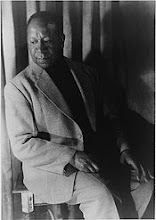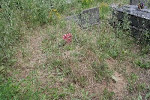Rose Art Museum at Brandeis University is proudly touting its Beauford Delaney abstract, entitled Abstraction (Greene Street), as part of its re: collections, Six Decades at the Rose Art Museum exhibition.
(1950) Oil on canvas
Gift of Mr. Maurice Geller, -.1050.
© Estate of Beauford Delaney,
by permission of Derek L. Spratley, Esquire,
Court Appointed Administrator
Image courtesy of Michael Rosenfeld Gallery LLC, New York, NY
Curatorial Intern Sam Forman describes the work as follows:
Greene Street (1950) is filled with swirling colors that evoke a sense of motion around its stationary black figures, reflecting the vibrancy of city life even in still moments. One cannot quite tell who is who and what is what—where are these figures? Why are they together? What is nearby? The green-yellow-orange mound in the center appears to be a fire à la Can Fire in the Park (1946), an example of Delaney placing explicit focus on a community-building and -sustaining source of warmth and light. Every object in this piece, human or otherwise, feels slightly out of focus due to the meandering lines and multi-hued outlines, bringing the viewer back to those questions about the scene and its contents. The abstract nature of Greene Street (1950) lets the scene reflect an infinite number of moments as the figures can be anyone and anywhere.
The Rose’s Greene Street (1950) is rather different from some other Greene Street paintings. The Greene Street (1940) in the collection of the Museum of Fine Arts, Boston, features more defined objects, although it maintains the abstraction of the Rose’s. A Greene Street (1946) sold by art collector Jonathan Boos retains this characteristic: a streetlight, fire hydrant, and food carts are readily identifiable. These other pieces of the same name also lack the human focus that the Rose’s does: whereas ours features prominently three people, there is one person in the 1946 piece and none in the 1940 piece.
Rose Art Museum, Brandeis University, 2021
Photograph by Isometric Studio, Brooklyn, New York
Image courtesy of the Rose Art Museum
Rose Art Museum granted Les Amis an exclusive interview regarding Abstraction (Greene Street) 1950. Find it below.
Les Amis: When did the museum acquire Greene Street, 1950?
Rose Art Museum: Greene Street belonged to Brandeis University prior to 1961, when the museum was founded. It was gifted to the University with the credit line, “Gift of Mr. Maurice Geller.” Upon the Rose’s founding, it entered the museum’s collection. It was first displayed on January 18, 1971 at Brandeis University in the Morton May Memorial Hall, now the Shapiro Admissions Center.
Les Amis: Is the painting on permanent display?
Rose Art Museum: No. The Rose does not display any works permanently, but it is currently on view within the exhibition re: collections, Six Decades at the Rose Art Museum.
Les Amis: Has it ever been displayed at the Rose Museum prior to the current exhibition?
Rose Art Museum: It has been displayed on the Brandeis campus, but there is no record of it being exhibited at the Rose prior to May 2021, when we opened re: collections.
Les Amis: What is the full exhibition history of the painting?
Rose Art Museum: Aside from its display in the Morton May Memorial Hall in 1971, one exhibition is in our record: "Beauford Delaney: The New York Years / [1929-1953]," April 9-May 28, 1994, Philippe Briet Gallery, New York. This is the exhibition in which University officials discovered the whereabouts of Greene Street two decades after it was stolen.
Beauford Delaney: The New York Years
Invitation card (interior)
Courtesy of Sylvain Briet
Les Amis: Might your Greene Street painting be the one shown in a 1950 exhibition at the Whitney Museum?
Rose Art Museum: We are unsure—Whitney research and archives experts may be able to help. I found a “catalogue number 88” listed with Delaney’s name in that exhibition but cannot access anything specific. The New York Times also potentially has an article on the exhibition, accessible with a subscription to the newspaper.
Les Amis: What is the full provenance of the painting?
Rose Art Museum: There is no provenance record at the Rose, aside from the gift by Maurice Geller.
Les Amis: I understand that Greene Street was stolen in 1971 and the whereabouts of the painting were unknown for several years before it was recovered in 2000. Please provide details about the theft and the recovery.
Rose Art Museum: The November 21, 2000 edition of The Justice, Brandeis’ oldest newspaper, ran “Stolen painting’s brush with adventure ends” about how Greene Street was stolen around April 1971 after its display in the Shapiro Admissions Center. In 1994 the work appeared in a gallery show in New York City, detailed above. Brandeis General Counsel Judith Sizer worked for six years to bring it back, contacting the New York Police Department which held the painting in that time, and fighting another claimant to ownership of the painting. In 2000 Ed Callahan, Brandeis’s director of public safety, got the NYPD to release the work and return it to the University.
Les Amis: Did Beauford name the painting or was the name ascribed by someone else?
Rose Art Museum: Delaney had numerous paintings that are now called Greene Street, either as their name or connected to their actual untitled status. The full name of the Rose’s is Abstraction (Greene Street) and I can find no information on who named it, Delaney or otherwise.
Installation view, re: collections, Six Decades at the Rose Art Museum
Rose Art Museum, Brandeis University, 2021
Photograph by Isometric Studio, Brooklyn, New York
Image courtesy of the Rose Art Museum
re: collections will be on view for three years, with several rotations.
Rose Art Museum
Brandeis University
415 South Street
Waltham, MA 02453
Telephone: 781-736-3434
roseartmuseum@brandeis.edu
Hours: Wednesday - Sunday 11 AM - 5 PM
Admission is free.







No comments:
Post a Comment